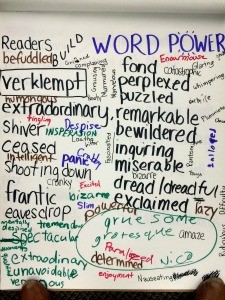
The Horn Book website has lots of material of interest to teachers. Here are some areas to explore. And follow us on Twitter: #lollysclass
|
Interviews with authors and illustrators Recommended books -- reviews and themed book lists |
School -- reading in school, author visits, and more Suggestion box: what else to you want to see in Lolly's Classroom? |
In a word…the logophile’s journey
Every group text, email chain, and Facebook thread has one… that one member who can’t help but change someone’s “who” to “whom,” who balks at the improper use of “their” and “there,” and who inserts the little star symbol to indicate a correction on a daily basis.

The hook was simple. I started off by telling my students that I had come across a funny word, one that I had never seen before in a book I had been reading over the December break… the word was VERKLEMPT. This produced some giggles, and a lively discussion of how I soon discovered what this word meant, and my eagerness to use it in other aspects of my reading and writing life. This jump-started a phenomenon, as students dove through their Just Right books to encounter power words of their own. Our chart paper was soon covered with words of power – gallop, bewildered, devastated, overwhelmed, stupefied, trotted, and reverence. Minilessons that followed included utilizing reference tools, identifying context clues, and being word conscious readers who identified words as a way to set the mood or tone of a story.
Continuing on my path of teaching to my passions, I had been looking for a way to incorporate one of my (and the world’s) most beloved storyteller, Roald Dahl, into my guided reading lessons. Here was my chance! Who uses language in a more vivid and engaging manner than a man who created words such as “gobblefunk” and “scrumdiddlyumptious?” Now that my students had identified the power of words, we delighted in Roald Dahl’s use of nonsense words, and used our word conscious skills to identify his messages to readers. We were also ready to begin examining how words are used together when forming phrases or sentences. With James and the Giant Peach as my mentor text, students identified similes, metaphors, idioms, hyperbole, and alliteration! As we branched off into groups, we noticed similar relationships in Danny, Champion of the World, Fantastic Mr. Fox, and The Magic Finger. Oh, and not to be remiss, verklempt means “overcome with emotion.”
As always, my excitement poses more questions:
How do you bring the power of words to your classroom?
RELATED
RECOMMENDED
ALREADY A SUBSCRIBER? LOG IN
We are currently offering this content for free. Sign up now to activate your personal profile, where you can save articles for future viewing.






Add Comment :-
Be the first reader to comment.
Comment Policy:
Comment should not be empty !!!